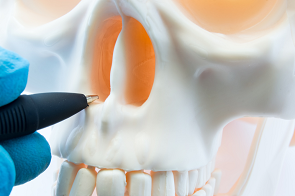What is Sinus?

There is 4 major pair of Sinuses
- Frontal (in the forehead)
- Maxillary (behind the cheek bones)
- Ethmoid (between the eyes)
- Sphenoid (behind the eyes)
Most of the sinuses drain into a key area (Osteo-Meatal complex). Thus treatment of sinusitis is focused on this area.
What is Sinusitis
Infection of Sinuses is called Sinusitis–acute or chronic based on the time span. Sinusitis may be caused by anything that interfere with airflow into the sinuses and mucous drainage out of the sinuses, usually follow a viral infection, allergy, or irritants. Most common bacteria involved are streptococcus pneumonae, Haemophilus influenzae, and moraxella catarhalis.
How to Diagnose Sinusitis? Symptoms of Sinusitis
-
Nasal congestion and discharge or post nasal drip
-
Headache, or facial pain/pressure , or pain under or around the eyes
-
Fever
Chronic sinusitis may present with
-
Reduced /absent smeel sensation (anosmea)
-
Fever and bad smeel from mouth (halitosis)
-
Cough (worse when lying down)
-
To achieve normal healthy sinuses
-
To decrease duration of the symptom
-
To prevent complications
-
To prevent development of acute sinusitis

